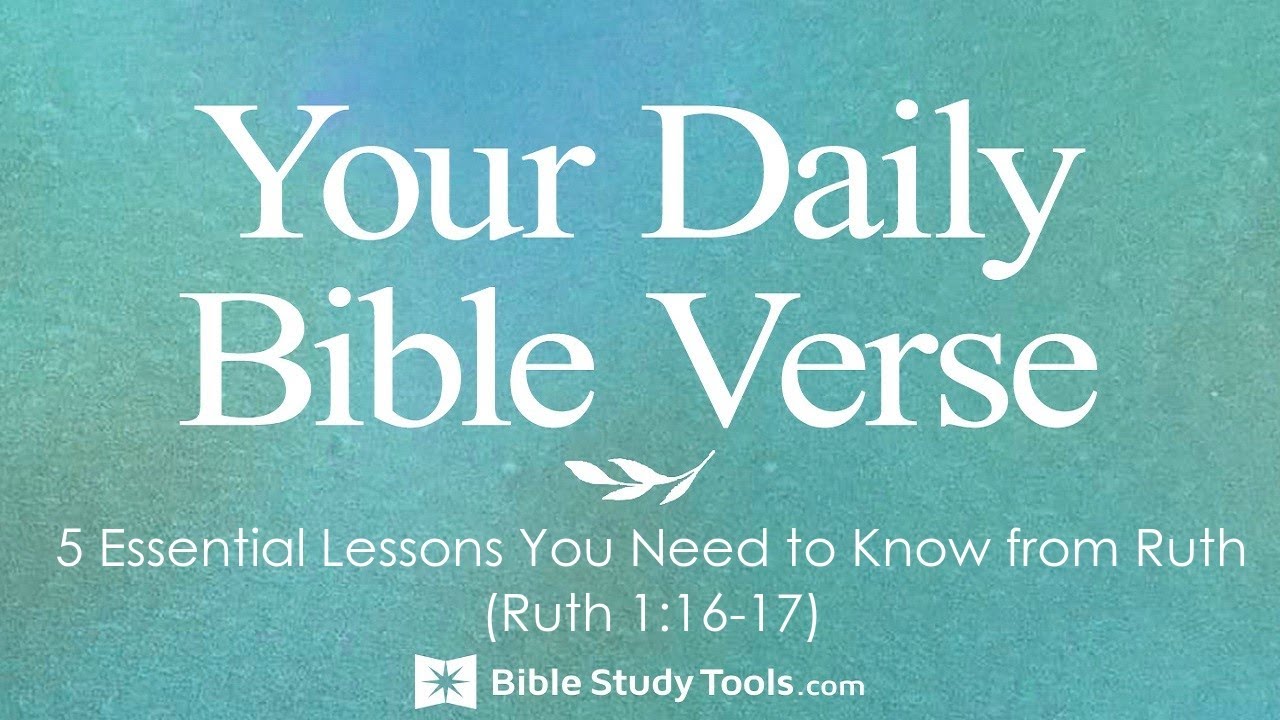In the vast tapestry of biblical narratives, the Book of Ruth shines as a beacon of loyalty, faith, and resilience. Ruth 1:16-17 encapsulates a pivotal moment in the story, where Ruth, a Moabite widow, expresses her unwavering commitment to her mother-in-law Naomi and to the God of Israel. These two verses resonate through the ages, inspiring countless readers with their profound message of love and devotion. Let’s delve deeper into the significance of Ruth 1:16-17 and explore the timeless lessons it imparts.
The backdrop of Ruth’s declaration of loyalty is a tale of loss and displacement. Famine and tragedy force Naomi, her husband, and her two sons to leave their homeland of Bethlehem and seek refuge in the land of Moab. However, tragedy strikes again when Naomi’s husband dies, leaving her a widow. Her sons marry Moabite women, Orpah and Ruth, but they too meet untimely deaths, leaving Naomi bereft of family in a foreign land.
Facing the prospect of returning to Bethlehem alone, Naomi urges her daughters-in-law to go back to their families, to find new husbands and start afresh. Orpah tearfully agrees, but Ruth’s response echoes through eternity: “Don’t urge me to leave you or to turn back from you. Where you go I will go, and where you stay I will stay. Your people will be my people and your God my God. Where you die I will die, and there I will be buried. May the Lord deal with me, be it ever so severely, if even death separates you and me” (Ruth 1:16-17, NIV).
Ruth’s words are not merely a pledge of loyalty; they signify a profound spiritual transformation. As a Moabite, Ruth had been raised in a culture that worshipped pagan gods. Yet, through her relationship with Naomi and her experiences in Naomi’s household, Ruth comes to embrace the God of Israel wholeheartedly. Her declaration reveals a deep-seated faith and a willingness to forsake her own people and traditions in favor of serving the one true God.
Moreover, Ruth’s commitment to Naomi goes beyond mere duty or obligation. It is rooted in genuine love and compassion. Despite Naomi’s insistence that Ruth return to her own family, Ruth refuses to abandon her. Instead, she chooses to stand by Naomi’s side, offering her unwavering support and companionship in her time of need. In a world where self-interest often reigns supreme, Ruth’s selfless devotion to her mother-in-law shines brightly as an example of sacrificial love.
Ruth’s declaration also underscores the importance of community and belonging. By aligning herself with Naomi and the people of Israel, Ruth finds a sense of identity and purpose that transcends her own personal circumstances. She willingly embraces a new culture and a new way of life, integrating herself into the fabric of Israelite society. In doing so, Ruth becomes not just a foreigner or an outsider but an integral part of God’s chosen people, with a unique role to play in the unfolding of His divine plan.
Furthermore, Ruth’s words foreshadow the remarkable journey that lies ahead. Her decision to accompany Naomi back to Bethlehem sets in motion a series of events that will ultimately lead to her own redemption and restoration. Through her humility, perseverance, and faithfulness, Ruth becomes the ancestress of King David and, by extension, of Jesus Christ Himself. Thus, Ruth’s story serves as a powerful reminder that God can use even the most unlikely individuals to accomplish His purposes and bring about His kingdom on earth.
In a broader sense, Ruth 1:16-17 speaks to the universal themes of loyalty, faith, and the bonds of kinship. It challenges us to examine our own relationships and consider the depth of our commitment to those we hold dear. Are we willing to stand by our loved ones through thick and thin, even when the path ahead seems uncertain? Are we prepared to make sacrifices for the sake of others, putting their needs above our own? Ruth’s example urges us to answer these questions with a resounding yes, demonstrating that true love knows no bounds and that faithfulness will always be rewarded in the end.
Moreover, Ruth’s story offers hope to those who find themselves in the midst of difficult circumstances. It reminds us that even in our darkest moments, God is at work behind the scenes, orchestrating events according to His divine will. Just as Ruth’s journey from Moab to Bethlehem ultimately leads to blessing and redemption, so too can our own trials pave the way for greater spiritual growth and transformation. As the apostle Paul writes, “And we know that in all things God works for the good of those who love him, who have been called according to his purpose” (Romans 8:28, NIV).
Conclusion
Ruth 1:16-17 stands as a timeless testament to the power of loyalty, faith, and love. Through her heartfelt declaration, Ruth exemplifies the virtues of selflessness, courage, and devotion, inspiring readers of all generations to follow in her footsteps. Her story serves as a reminder that no matter how dire our circumstances may seem, God is always faithful to those who trust in Him. As we journey through life, may we cling to the promise of Ruth’s words, finding strength and hope in the knowledge that we serve a God who will never leave us nor forsake us.

